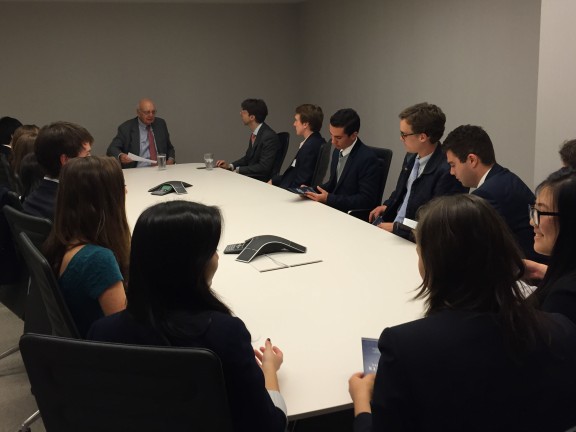Volcker Speaks with Princeton Freshmen about Ethics in Finance

On Thursday, October 29th, Paul A. Volcker met with 14 freshman students at Princeton University as part of a seminar on ethics in finance. The group spoke about structural issues in the U.S. financial system that led to the global financial crisis and ongoing reforms, ethical issues encountered in finance, and the challenge and satisfaction to be found in public service. The students asked Mr. Volcker questions about the impact of the Volcker Rule, the future of the financial system, and corruption. They also solicited career advice.
In response to a question about whether the current financial regulatory system can be changed for the better, Mr. Volcker highlighted some of the structural reforms recommended in the Alliance’s report, Reshaping the Financial Regulatory System. He described the rapidly changing environment in the financial markets, noting that now “Most of the action takes place outside of banks. That means that there are many new opportunities in finance today for corruption and market distortions.”
The group also discussed the ethical dilemmas that confront people working in finance, often necessitating the choice to forego one’s short term interests when it conflicts with a strong sense of fiduciary responsibility. Mr. Volcker told the students, “There is nothing you will do that won’t involve a conflict of interest.” Stressing the importance of maintaining perspective and evading the “culture of institution” that pervades the financial sector, Mr. Volcker advised the students to assume an attitude of skepticism about many current practices. “Ask yourself: What is this doing for the health of the economy? Is it improving anything? Is this a meaningful investment? Does this serve any economic function whatsoever? Is it helping anyone? Is it improving life in the United States?”
Mr. Volcker bemoaned the declining interest in working in government: “You’re in a sad period right now for public service. Sixty years ago, most of this class would be aspiring to work for the government or in a public administration role.” He encouraged the students to consider careers in public service, and mentioned the need for better educational training for students interested in public policy implementation.